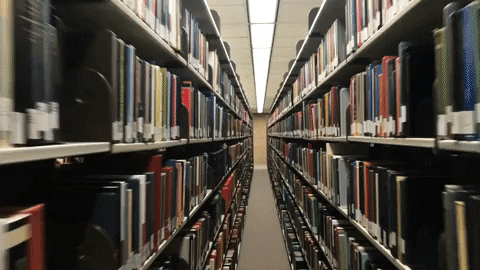“The library will endure; it is the universe,” Jorge Luis Borges writes in his magical realist masterpiece, The Library of Babel. Although Borges’s library takes the shape of a fantastical nightmare of infinite shelves with enumerable books, he makes one realistic point. While we might not see it, hidden behind the scenes, libraries contain complicated systems of catalogs and databases just as complex as the cosmos. Like how those interested in the actual universe have astronomy, librarians have library science. Pursuing a degree in this field allows you to explore the hard work that goes into organizing the resources we use for studying and researching every day.
If you want to study library science, this guide will give you a glimpse at what it takes.
What You’ll Be Doing

Contrary to popular belief, studying library science involves more than just the Dewey Decimal System. “Going to library school was like learning new things about an old friend,” University of Hawai’i at Mānoa graduate Louis To said. You do learn the basics: how to catalog, sort and shelve materials, but you also get lessons in more specific areas, like the history of books and the ethics of information access. The broad range of classes available to library science majors allows you to customize your education to your specific interests. If you love movies, you can study how to handle aging film stock and iconic movie artifacts. If you prefer music, you can take courses dedicated to the preservation of centuries-old music manuscripts. Just as with any other scientific field, library science allows you to tailor your degree track to your intended career focus, which transforms the seemingly tedious task of alphabetizing books into an exciting and individualized educational journey.
Classes You’ll Take

Start at the very beginning with a history of books course, which details the evolution of literacy and literary objects from cave paintings to iPads. Library management classes closely resemble their counterparts in the business major, giving you a grasp on the administrative side of libraries. In a similar vein, collection development courses establish how libraries actually acquire materials, including lessons on budgets and copyright laws. Entering into a more philosophical realm, information ethics outlines the morality of informational access as well as issues of intellectual property, data accuracy and censorship. After you master these basics in your first couple years, you can move on to more specialized classes like youth programming. “I created a year-long plan including story times, book clubs, movie nights and other age-appropriate activities. It was one of my more intensive classes but it was fun to see it all come back to the importance of literacy and reading,” reference librarian and library science alum Leo Martinez said.
Internships For This Major

Gaining experience in the library science field doesn’t have to mean sitting behind a desk all day. Go for the gold at the Academy of Motion Picture Arts and Sciences for the conservation internship, where you assist the pros at the Margaret Herrick Library to upkeep an extensive collection of screenplays, costume drawings and photographs from classic movies. For those more STEM-inclined students, NASA’s Jet Propulsion Laboratory offers opportunities for undergrads to help digitize decades’ worth of data. In a role straight out of Moneyball, Major League Baseball teaches their data science interns to process player stats and generate conclusions that broadcasters use on air during their coverage. Experience like this will give you more than just school credit too. “This is also one of those professions where you keep learning as you work. I’ve probably learned more since graduating than I did in school,” Middlebury College Film & Media Librarian Amy Frazier said.
Career Opportunities

Even though Library Science literally has “library” in its name, your options after entering this field extend far beyond the stacks.
1. Librarian
For those of you looking to become Evelyn Carnahan from The Mummy, take this most obvious route. But under the huge librarian umbrella, countless options await. You have the classic public or academic librarian, of course. You can also pursue librarian positions in more specialized venues like music, medicine or law libraries. Museums and large art galleries often need librarians to help maintain their collections too. You could even use the force as a Sound FX librarian for LucasFilms.
2. Archivist
If you watched National Treasure and cringed at Nicolas Cage’s handling of the Declaration of Independence, definitely pursue this path. Archivists acquire, authenticate and preserve artifacts, usually for a museum. At the turn of the century archivists also became responsible for digitizing these artifacts, so you’d need to have major tech skills.
3. Data Curator
Speaking of tech, data curation offers a relatively new technology-based option for library science majors. They combine the IT and business worlds to help bridge the gap between those who collect data and those who use it to help their company. Data curators help analysts process information and make meaning out of the seemingly random digits.
4. Reference and Research Specialist
This one takes the art of school research essays to the career level. Specialists aid other researchers in their work, using their knowledge of their collections to pinpoint the required materials quickly. They also put to use the lessons they learned in research methods courses to tailor their research approach to each individual project.
5. Web Content Strategist
For those hoping to work their communication skills into their library science studies, becoming a web content strategist provides the perfect opportunity. Strategists work with companies to help devise plans to best convey information on their websites. You would use the organizational skills acquired through your library science degree, but you would also get to exercise your creativity. In addition to this, you’ll need effective writing abilities to help clients to clearly and concisely deliver their message.
Reviews

“Studying library science taught me about the broad expectations for practitioners, no matter the library type or job title. Given that many libraries and educational environments are experiencing widespread budget ‘squeezes,’ every librarian is expected to wear more than one hat. Learning about many different types of library skills: indexing/abstracting, search strategies, library management, collection development, and information services etc. was prescient since I do many of those things despite my specific job title.” –Raquel K. W. Donahue, Texas Woman’s University graduate.
“I really enjoyed learning about the systems and structures that make libraries possible. How information is organized, approaches of working with patrons and issues related to copyright and intellectual freedom. And outside of classes, all of us library students would socialize. It’s a pretty tight–knit professional community, which can be a lot of fun.” –Amy Frazier, Emporia State University graduate and Film & Media Librarian at Middlebury College.
“Library school prepared me for most scenarios that would come up in the line of work such as reference interactions, handling donations and, most interestingly, the ethical questions around censorship and access that come with being a keeper of information. Learning the basics of cataloging with MARC and RDA also came in handy. Usually, students choose a type of library to specialize in: public, academic, special, school or archives. Most librarians‘ careers weave across many types of libraries depending on the job opportunities available. For example, I chose special libraries, but my first job out of library school was as a school librarian. It definitely helped to reach out to peers in the library program that did specialize in school librarianship to get advice.” –Louise To, University of Hawai’i at Mānoa graduate.



















